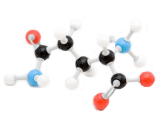
Carnosine is a dipeptide of the amino acids beta-alanine and histidine. It is highly concentrated in muscle and brain tissues. Carnosine can oppose glycation and it can chelate divalent metal ions. Chronic glycolysis is suspected to accelerate aging.Carnosine was found to inhibit diabetic nephropathy by protecting the podocytes and mesangial cells.Because of its antioxidant, antiglycator and metal chelator properties, carnosine supplements have been proposed as a general anti-aging therapy. Some studies have detected beneficial effects of N-acetyl-carnosine in preventing and treating cataracts of the eyes; in one of these, carnosine was found to reduce cloudiness in rat lenses that were exposed to guanidine to cause cataracts. However, claims that carnosine confers these and other posited ophthamological benefits are, as of yet, insufficiently supported for endorsement by the mainstream medical community.
Organism species: Pan-species (General)
| CATALOG NO. | PRODUCT NAME | APPLICATIONS | |
| Proteins | CPB450Ge11 | BSA Conjugated Carnosine (Car) | Immunogen; SDS-PAGE; WB. |
| CPB450Ge21 | OVA Conjugated Carnosine (Car) | Immunogen; SDS-PAGE; WB. | |
| Antibodies | PAB450Ge01 | Polyclonal Antibody to Carnosine (Car) | ELISA, CLIA. / IHC-Fr, ICC, IP (predicted). |
| PAB450Ge02 | Polyclonal Antibody to Carnosine (Car) | ELISA, CLIA. / IHC-Fr, ICC, IP (predicted). | |
| Assay Kits | CEB450Ge | ELISA Kit for Carnosine (Car) | Enzyme-linked immunosorbent assay for Antigen Detection. |
